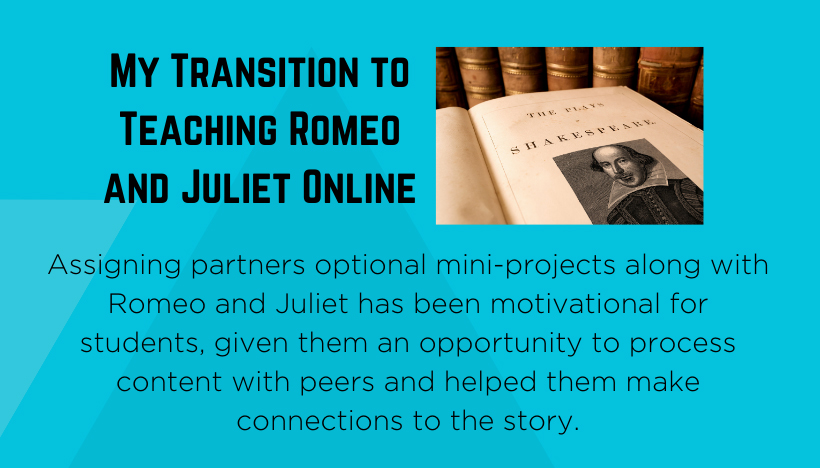This post was written by NCTE member Kasey Short.
I had planned to begin teaching Romeo and Juliet in late March, and once it was certain that the entire unit would be done during remote learning, I knew that there would need to be a lot of changes to my original plans.
Romeo and Juliet is a challenging read for most students and the idea of doing it all remotely was overwhelming at first, but with the help of my teaching partner, we were able to adapt and craft experiences that would help students comprehend the text and make connections.
We had planned to use Gareth Hinds’s graphic adaptation of Romeo and Juliet as a companion in the classroom by using classroom sets of the book. Since this was no longer an option, I wrote to the publisher and received permission to share the book online with my students during this time. Sharing this book on my private PowerSchool page allowed students to benefit from the graphic adaptation of the novel and the visuals helped the students stay engaged and assisted their understanding of the text.
In order to get a quick formative assessment of the students’ understanding, students participated in online discussion boards and periodically took online quizzes. This allowed me to reach out to any student with misconceptions.
Assigning partners optional mini-projects along with Romeo and Juliet has been motivational for students, given them an opportunity to process content with peers, and helped them make connections to the story. I assigned three of these projects throughout the unit:
- Scene Writing: Students were asked to adapt a scene from the play. This adaptation asked them to follow the same basic storyline but create their own setting and circumstances that prevented two people from being together. It was fun to see them pulling in all kinds of obstacles people face in our current society, including a few that used the COVID-19 stay-at-home orders as the reason they couldn’t be together.
- Song Assignment: Students choose three songs that had the same mood as a part of the play. They then explained the mood of both the song and the part of the play and how they were similar.
- Digital Communication: Students crafted digital communication between Romeo and Juliet after Romeo was banished. This communication asked them to imagine what Romeo and Juliet might have said to each other if they had had access to digital communication. They could create any type of digital communication such as text messages, Snapchat, Twitter, etc. Many of them used the website textingstory.com and it created a nice video of their texts.
Most students chose to work with a partner for these assignments. For the first assignment, students were given the opportunity to work with any student that I teach, even if they were not in the same class, and then I opened it up to any student in the grade to increase opportunities for collaboration. Students used Facetime, Zoom, Google Meet, and shared Google docs to collaborate.
I received a lot of positive feedback from students and parents about the opportunity to collaborate remotely. One parent emailed saying how much she enjoyed hearing her daughter laughing and discussing Shakespeare on Facetime with a friend. The teaching and learning challenges continue, but opportunities to be creative and collaborate are definite aids to student motivation and engagement.

Kasey Short attended UNC-Chapel Hill and earned a BA in middle school education with a concentration in English and history. She went on to earn a Master’s of Education in curriculum and instruction from Winthrop University. She is currently an eighth-grade English teacher and English department chair at Charlotte Country Day School, North Carolina. Twitter: @Shortisweet3.
It is the policy of NCTE in all publications, including the Literacy & NCTE blog, to provide a forum for the open discussion of ideas concerning the content and the teaching of English and the language arts. Publicity accorded to any particular point of view does not imply endorsement by the Executive Committee, the Board of Directors, the staff, or the membership at large, except in announcements of policy, where such endorsement is clearly specified.

